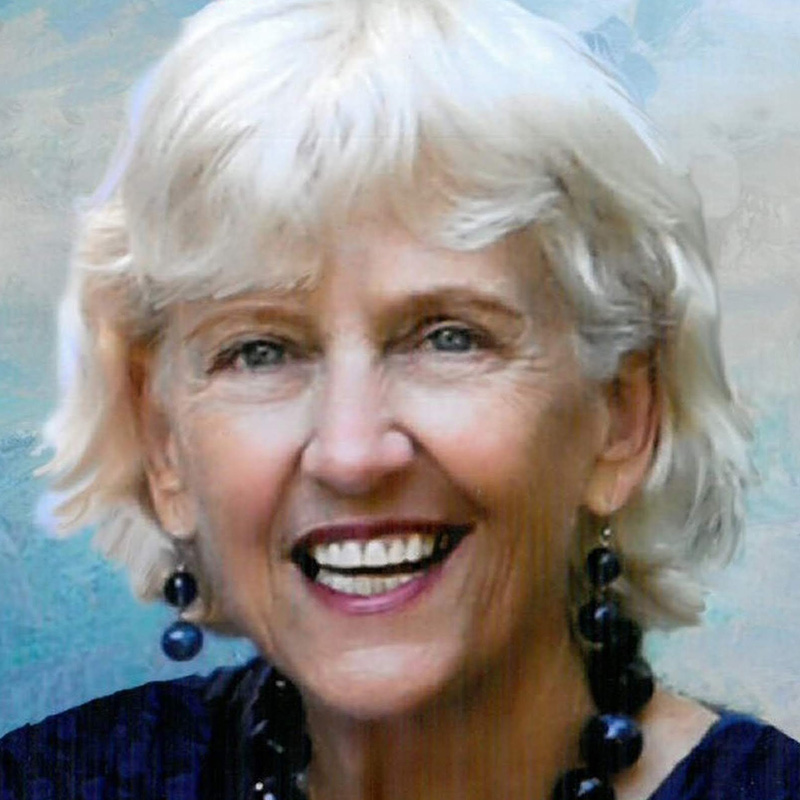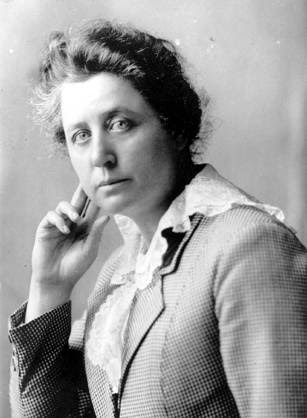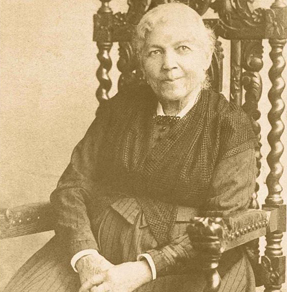The first woman supervisor of branch libraries of the Boston Public Library, Edith Guerrier (1870-1958) included social reform in library programs. She wrote, “Public libraries are the possession of the people. . . . librarians must not be merely keepers of the archives; they must enter into the daily lives of the people to the extent of furnishing timely material related to daily living.” Edith organized library clubs for immigrant girls to encourage reading, storytelling, and exchanging ideas and co-founded Paul Revere Pottery to provide girls employment with decent wages in a healthy environment.
A pioneer in the field of library science, Edith Guerrier (1870-1958) was a Progressive Era librarian who included social reform into public library programs for urban immigrant girls. Her mother Emma Ricketson was local historian Daniel Ricketson’s daughter, and her father George Guerrier had briefly been in business with Daniel’s brother Joseph. Emma Ricketson and George Guerrier were married without her father’s permission on September 2, 1867, by Samuel Fox, chaplain of Seamen’s Bethel and George Guerrier’s uncle. Edith was born three years later on September 20, 1870. Her father soon left to seek employment in the West with the plan that Emma and Edith would shortly join him. Before the move took place, when Edith was three years old, her mother died of consumption. Two of Daniel Ricketson’s other children, Anna and Walton, who had never married and lived in the Ricketson home at Brooklawn, would become surrogate parents for their niece Edith.
After Daniel Ricketson failed to provide his daughter Emma’s inheritance to her widower George, Edith’s father began a pattern of moving her back and forth between her mother’s wealthy family in New Bedford and his own poor relatives, including his uncle Samuel Fox. This uncle moved often from parish to parish as a Methodist minister throughout southern New England.
The Edith Guerrier Papers, part of the Ricketson Family Papers at the New Bedford Whaling Museum Research Library, include Edith’s autobiography manuscript, where she fondly remembers her childhood days in New Bedford. At the Ricketson home, Uncle Walton made her bedroom furniture from black walnut, and Aunt Anna filled her closet and bureau with handmade clothes – cashmere dress, pinafore, coat, shirts, and petticoats. Her grandmother knit her slippers. Her bedroom was covered in cream wallpaper with gold stars. “It was the most beautiful little room I had ever seen,” wrote Edith, who prayed each night that her father would leave her with Aunt Anna and Uncle Walton in New Bedford forever. In the mornings, Edith attended New Bedford schools, where she learned to read and was introduced to poetry. In the afternoons, Uncle Walton would take the family on carriage rides, often to New Bedford’s waterfront. Edith traced her love of books and storytelling to Uncle Walton, who would read aloud or tell stories as Edith sat on his knee. He also introduced Edith to the ideas of Henry David Thoreau, Ralph Waldo Emerson, and Bronson Alcott, all friends of Daniel Ricketson.
When Edith was 10 years old, George Guerrier abruptly took Edith from the Ricketsons in New Bedford to live with his family throughout New England in frequent moves that ended with Edith’s eventual stay on a Kansas prairie with her father. In the fall of 1887, Edith moved back east to attend the Vermont Methodist Seminary and Female College in Montpelier, where she studied for four years until her graduation in 1891. With aspirations of becoming an artist, Edith next enrolled in the Museum School of the Museum of Fine Arts in Boston. With so much instability in place and social class throughout her youth, Edith learned to be resilient and independent.
When Edith moved to Boston in 1892, settlement houses had been established to support the growing immigrant populations at the same time that the Boston Public Library was focusing on providing services to these residents. Edith began to work in the nursery of a settlement house at North Bennet Street Industrial School in Boston’s North End. Soon she began to organize girls’ clubs to encourage reading, storytelling, dramatization and exchanging ideas. The most successful group, the Saturday Evening Girls, was made up of Jewish and Italian girls of high school age who participated in increasingly sophisticated activities, including a play translated into Italian. Edith’s work with the girls’ clubs led to her career in librarianship, as the North Bennet School became a daily book delivery station of the Boston Public Library with Edith in charge. Her girls’ groups became library groups for girls of all ages and met in this new North End Branch. Dedicated to including social services in library work, Edith promoted change in library service to include children’s programming and storytelling. As a librarian at the Boston Public Library, Edith made inaccessible books available to the public through open shelving, organized a room for government documents, began bookmobile services, and made improvements to the branch libraries. She would soon become the first woman supervisor of branch libraries of the Boston Public Library.
In 1908 in response to the need of the Saturday Evening Girls library group to make a meaningful living wage, Edith Guerrier founded Paul Revere Pottery with her lifelong companion, the artist Edith Brown (1870-1958). As an alternative to factory and domestic work, and with the financial backing of Helen Osborne Storrow (1864-1944), the pottery provided employment for girls through eight-hour workdays in a healthy environment with decent wages, an annual paid vacation, a daily hot lunch and even education: great works of literature were read aloud as the girls worked. Using Edith Brown’s designs which reflect the nature motifs of the Arts and Crafts Movement aesthetic, the Pottery continued until 1942. Today Paul Revere Pottery dishes, cups, vases, bowls and tiles are collected by museums, including Boston’s Museum of Fine Arts.
During World War I, from 1917 through about 1918, Edith became head of the library section of Herbert Hoover’s National Food Administration, where she was in charge of collecting, organizing and distributing information to public libraries across the country. In 1941, she wrote We Pledged Allegiance, A Librarian’s Intimate Story of the United States Food Administration as an account of her work in the federal government. She wrote, “Public libraries are the possession of the people. To justify claim to this statement librarians must not be merely keepers of the archives; they must enter into the daily lives of the people to the extent of furnishing timely material related to daily living.” Edith played a pivotal part in shifting librarians away from the traditional role of book collection toward new roles in readers’ advisory and promotion of reading to change lives. Her pottery can be seen as a precursor to the 21st – century maker movement in youth library services. Many of the women from her library clubs would later attend Simmons College, a new women’s college with the mission of training women for worthwhile careers. Edith died in 1958 at the age of 88.
Ann O’Leary and Mary Howland Smoyer
Information from
- Bausman, Margaret. “A Case Study of the Progressive Era Librarian Edith Guerrier: The Public Library, Social Reform, ‘New Women’, and Urban Immigrant Girls.” Library & Information History, vol. 32, no. 4, Nov. 2016, pp. 272-292
- Chalmers, Meg, and Judy Young. The Saturday Evening Girls Paul Revere Pottery. Schiffer Publishing, 2005.
- Guerrier, Edith. An Independent Woman: The Autobiography of Edith Guerrier. Edited by Molly Matson, U of Massachusetts P, 1992.
- New Bedford Whaling Museum Research Library Mss 13. Ricketson Family Papers. Sub-group 12: Edith Guerrier Papers. https://www.whalingmuseum.org/collections/highlights/manuscripts/mss-13/. Accessed April 4, 2022.
!["[Edith Guerrier]," Silver Gelatin Print, New Bedford Whaling Museum, 2000.100.90.80 Edith Guerrier (1870-1958)](https://historicwomensouthcoast.org/wp-content/uploads/2017/11/DEMO-PIC-337x337.jpg)




